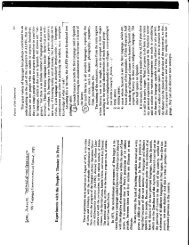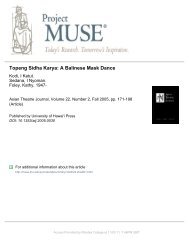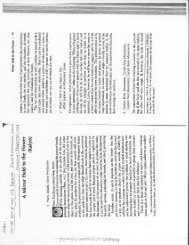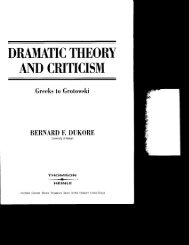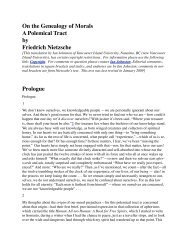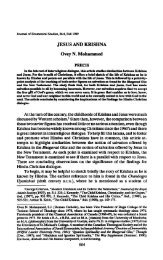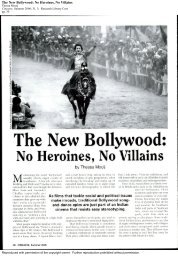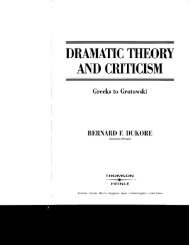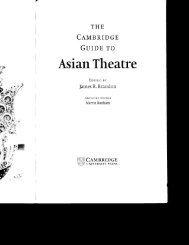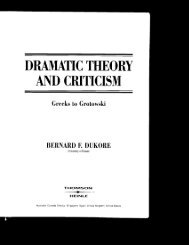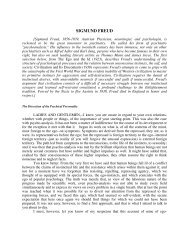Contrary Notions of Identity in As You like It - Yavanika
Contrary Notions of Identity in As You like It - Yavanika
Contrary Notions of Identity in As You like It - Yavanika
Create successful ePaper yourself
Turn your PDF publications into a flip-book with our unique Google optimized e-Paper software.
236<br />
IDENTI TY IN AS YOU LIKE IT<br />
unable to rest for long <strong>in</strong> the <strong>in</strong>ertia <strong>of</strong> any s<strong>in</strong>gle attitude or emotion.<br />
This experience <strong>of</strong> greater <strong>in</strong>clusiveness which disguise <strong>in</strong>augurates<br />
<strong>in</strong> the audience is mirrored and re<strong>in</strong>forced by the greater <strong>in</strong>clusiveness<br />
which the characters themselves achieve through disguise. In<br />
satiric comedy disguise is used to deceive and triumph over someone.<br />
Although this motive is not altogether absent <strong>in</strong> Shakespeare, the end<br />
result <strong>of</strong> disguise is here not the <strong>in</strong>tensified exclusiveness <strong>of</strong> self but<br />
rather a greater <strong>in</strong>clusiveness. This result is apparent when Rosal<strong>in</strong>d<br />
appears <strong>in</strong> disguise with Celia and Touchstone. She compla<strong>in</strong>s <strong>of</strong> wear<strong>in</strong>ess<br />
and would <strong>like</strong> to cry, but because <strong>of</strong> the role she is play<strong>in</strong>g, she<br />
is able to take another perspective on her situation and resist the <strong>in</strong>ertia<br />
<strong>of</strong> her immediate emotion: "I could f<strong>in</strong>d <strong>in</strong> my heart to disgrace my<br />
man's apparel and to cry <strong>like</strong> a woman," she declares, "but I must<br />
comfort the weaker vessel, as doublet and hose ought to show itself<br />
courageous to petticoat. Therefore, courage, good Aliena!"<br />
(II.iv.4-8). By embrac<strong>in</strong>g her role as Ganymede, Rosal<strong>in</strong>d is thus<br />
able to get outside her monistic, habitual self and achieve a more<br />
<strong>in</strong>clusive, <strong>in</strong>cohesive self that realizes the folly <strong>of</strong> romantic ideals even<br />
while lov<strong>in</strong>g Orlando. <strong>As</strong> a result, her love becomes more authentic,<br />
for <strong>in</strong> the end she self-consciously and deliberately gives herself to<br />
love <strong>in</strong>stead <strong>of</strong> be<strong>in</strong>g overthrown by it as she was at first.<br />
Orlando goes through a similar exercise <strong>in</strong> achiev<strong>in</strong>g a more <strong>in</strong>clusive<br />
self. <strong>It</strong> might appear that <strong>in</strong> his encounters with Ganymede's<br />
Rosal<strong>in</strong>d, Orlando is simply be<strong>in</strong>g himself. In actuality, however, he<br />
is play<strong>in</strong>g Orlando, and there is an important difference <strong>in</strong> the two<br />
perspectives. In play<strong>in</strong>g himself, Orlando, at the same time that he is<br />
himself, is forced to step outside himself and view this self as a mere<br />
role he is play<strong>in</strong>g rather than as his absolute identity. His roleplay<strong>in</strong>g,<br />
<strong>like</strong> Rosal<strong>in</strong>d's, thus works to lead him to new perspectives<br />
and hence creates <strong>of</strong> him a self <strong>of</strong> greater <strong>in</strong>clusiveness, a self more<br />
will<strong>in</strong>g to accommodate the other. Orlando must move beyond that<br />
self which, <strong>in</strong> the words <strong>of</strong> Kent Talbot van den Berg, "first desires his<br />
beloved as a physical object, and subsequently . . . re-creates her as a<br />
mental image."29 He must atta<strong>in</strong> that <strong>in</strong>clusiveness which views the<br />
other "as another subject who transcends both the object and the<br />
image . . . , [so that] the beloved's existence as a person <strong>in</strong>dependent<br />
<strong>of</strong> the lover's will is no longer threatened by the unmastered importunity<br />
<strong>of</strong> desire or ignored <strong>in</strong> the solipsism <strong>of</strong> fancy, but is cherished by a<br />
respectful love."30 A truly <strong>in</strong>clusive self, a self <strong>of</strong> love, is a self <strong>of</strong> multiple<br />
perspectives that recognizes the pr<strong>of</strong>ound truth beneath Orlando's<br />
29Kent Talbot van den Berg, "Theatrical Fiction and the Reality <strong>of</strong> Love <strong>in</strong> <strong>As</strong> <strong>You</strong><br />
Like <strong>It</strong>, PMLA 90 (October 1975):891.<br />
'0lbid.<br />
This content downloaded on Thu, 7 Mar 2013 13:10:36 PM<br />
All use subject to JSTOR Terms and Conditions



